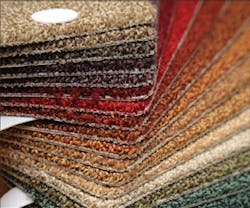The practice of recycling is picking up momentum, with new materials constantly being added to the list of recyclables. Carpet is one product that is continuing to grow in recyclability.
"Carpet recycling continues to grow throughout the United States," says Georgina Sikorski, executive director of Carpet America Recovery Effort (CARE). "According to the CARE 2009 Annual Report, 211 million pounds of post-consumer carpet was diverted from the landfill, of which 246 million pounds was recycled. Today, CARE has over 90 collectors who collect, sort, and process post-consumer carpet in the U.S."
Price of Plastic
"There’s actually a flurry of activity right now, which is predicated on a couple of things," explains Eric Nelson, the vice president of strategic alliances for Interface Americas and the company’s lead on recycling efforts. "The No. 1 is the price of petroleum and the increase that we’ve seen over the last 12 to 18 months. When you think about it, carpet is really a mishmash of plastics. With the exception of wool, which is a very small percentage, the vast majority of carpets that we use in North America are plastics."
Because plastics are made from petroleum, when the price of petroleum rises, the values of the raw materials that go into carpet also rise.
"The higher they get, the more it makes sense economically to try to recycle and get those old raw materials back into the supply chain," Nelson explains.
Public Policy Perspective
Changing public policy is also driving carpet recycling. "California has been the first state to officially pass a law, an EPR (extended producer responsibility) legislation," explains Nelson. "It was the first state to pass this type of law specifically aimed at carpet. In essence, the law says that if you want to sell carpet, you have to have a state-approved reclamation and recycling program. We think California is just the first of many states. Local governments may get involved. In Canada, there has been a lot of activity at the provincial level in considering legislation around old carpet."
Pure Economics
While the rising cost of raw materials and public policy are valid reasons to recycle carpet, they aren’t the only ones. The cost of sending carpet to the landfill may be incentive enough.
"If you’re a business that wants to recycle carpet, you might live in an area where landfill fees are quite high, and so it may be more economically viable for you to find a carpet recycler rather than send it to a landfill," says Nelson. If you’re located in an area with high landfill tipping fees, carpet recycling may be especially appealing.
In addition, it is more economically feasible to extract the raw materials from the disposed-of carpet and turn them into new products – from new carpet to automobile parts.
"Purchasing products made with recycled materials saves valuable natural resources and landfill space," says Sikorski. "Since 2002, carpet recycling has reduced greenhouse gas emissions by over 1.4 million MTCE (metric tons carbon equivalent), the equivalent of not driving over 1 million cars for one year."
However, while carpet recycling is becoming a more popular practice, it isn’t economically feasible in all locations, as recycling facilities aren’t located everywhere and carpet is economically inefficient to ship.
But be patient. "I think it’s just a matter of time before we can build out our industry regionally in the U.S. and across Canada, so that we can have local processing," Sikorski explains.
Several carpet companies are participating in carpet recycling efforts, recycling their own products in addition to products of their competitors. You can also get recycling information and find recycling locations near you at the CARE website.
"The best way to keep carpet out of the landfill is to partner with a collector in your community," says Sikorski. "Go to www.carpetrecovery.org to find out more about collectors in your region."
Kylie Wroblaski ([email protected]) is associate editor of BUILDINGS.
